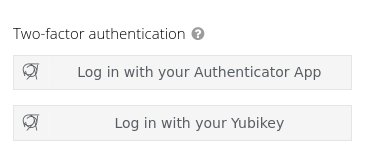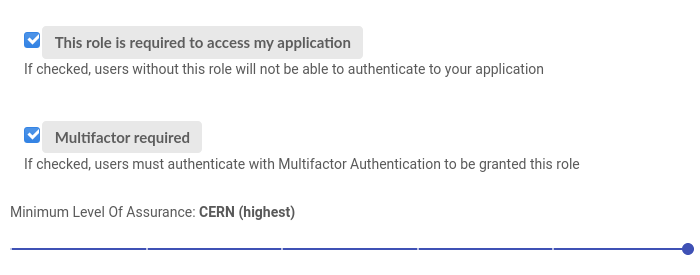---
# Multi factor authentication deployment in IT and its effects outside IT
---
## What is mFA/2FA?
* Protecting authentication beyond your first factor
* First factor stolen/phished: *no impact*
* Can protect:
* Single-Sign-On (SSO): any web app using the new SSO
* SSH: any SLC6, CC7, Centos 8 system...
----
### Supported 2nd factors
* Supported 2nd factors & requirements:
* [SSO&SSH] TOTP: smartphone authenticator app
* [SSH] Yubico OTP: Yubikey
* [SSO] U2F/WebAuthN: physical token (e.g. Yubikey)
* SMS not supported anymore:
* Not supported natively by Keycloak
* Not considered as secure as other options
----
### How to register a 2nd factor
* Registered at first use on the SSO (remotely):
* TOTP (smartphone authenticator app)
* U2F/WebAuthN (Yubikeys@SSO)
* Registered remotely via dedicated website:
* Yubico OTP (Yubikeys@SSH): https://sshsetup.web.cern.ch/
* No need to go to the self-service stations at CERN anymore
----
### Web 2FA authentication

* Password + 2nd factor only
* No step-up support, need to logout & re-login
----
### SSH authentication

* (Password|Kerberos|SSH Key) + 2nd factor
* Without kerberos, asking for login for unix service accounts
* login must be in `.k5login`

* Protip: Yubikey OTP or TOTP can be entered directly
----
### Obtaining a Yubikey outside IT
* Relatively expensive tokens (~50$):
* First batch discounted, but can't count on it
* Privately bought Yubikeys not useable for SSH:
* Keys need to be configured with keys known by CERN
* Not in CERN stores: removed due to inactivity
* Might be re-added in the future
* CERN IT providing the keys (at cost):
* Not tracked through Inventory: to be bought via TID
* Let us know ASAP if you will need more that 15-20 keys
---
## Implementing 2FA
* New implementation very similar to previous one
* Has been used by security team for years
* Starting to be used by CS & DB
* Tightly integrated into the new SSO
* Yubikey OTP supported separately for now
* Long term plan to integrate it tighter
----
### Web 2FA authentication
* Fully integrated into new standard SSO
* Special option when defining roles

----
### SSH 2FA authentication
* Configured via puppet's `multifactor` module
* Support for new infra: [CRM-3404](https://its.cern.ch/jira/browse/CRM-3404) & [CRM-3420](https://its.cern.ch/jira/browse/CRM-3420)
* Fully integrated in Centos 7 and 8 via pam:
* Transparent for `ssh`, `scp`, `sftp`, `rsync`, ...
* Degraded support on SLC6 (not recommended):
* Not using pam, not transparent
----
### Availability:
#### Two independent backends
* TOTP & U2F/WebAuthN:
* Fully dependent on Keycloak
* No other dependency
* Yubikey OTPs/SSH:
* User-yubikey mapping: Openshift + Postgresql DBOD
* Yubikey validation: WebDFS + Oracle DB
* To be re-evaluated on the long term (better intregration)
* Emergency access/backdoors being discussed
---
## Deployment plan:
### Step 1 -- AIADM & Puppet core
Target: March 31st 2020
* Protect AIADM with 2FA
* Protect puppet core services with 2FA:
* Foreman/Judy: website & API
* Teigi applications (API): pwn, tbag, tellme
* Mcollective
----
### Protect puppet service APIs with 2FA
* Can't modify the APIs themselves:
* Using IP-base whitelists
* Transparent for AIADM clusters
* Other systems: require equivalent security levels:
* List maintained by the Security Team
* Access protected by 2FA (any: SSH, web, tool, ...)
* Detailed logs of logins & actions sent to Security Team
* SSH almost covered by central monitoring
* Other applications to be discussed
----
### Proposed timeline (Step 1)
* February 2020:
* Users obtain and configure tokens (Yubikeys/TOTP)
* Identify servers for IP whitelisting: contact [me](emailto:vincent.brillault@cern.ch)!
* Validate/test 2FA deployments:
* SSH: `aiadm-multi.cern.ch`
* SSO: use `Two-factor authentication` options
* March 2020:
* Enable 2FA on AIADM (SSH) and Foreman (SSO)
* Enable IP restrictions for all APIs
* Ensure security level of servers in IP whitelist
* Deadline: March 31st (not April 1st)
---
## Deployment plan:
### Step 2.A -- SSH access to IT internals
Target: Summer 2020
* Protect access to IT internal systems with 2FA
* **Only for admin access in IT, no effect for *standard* users**
* User access to LXPLUS not affected
* Requiring either direct 2FA or through 2FA bastion
* Subject to validation & approval in April 2020
----
### SSH access to IT internal systems
#### `AIADM or equivalent`
* Two options (can be combined):
* Through 2FA bastions (AIADM or equivalent):
* Single factor authentication on the final system
* Detailed logs from the bastion (execlog & netlog)
* Direct access to the server with 2FA:
* Multifactor configured on the final system
* Access logs of the system sent to Security Team
* Corresponding toggle added to `base`:
* Multifactor configured with IP whitelist (2FA bastions)
* IP filter to 2FA bastions only
----
### Proposed timeline (Step 2.A)
* April 2020:
* Review of project & approval of next steps
* Add new toggle to `base` (default: `nothing`)
* May 2020
* Service managers in IT encouraged to change toggle and configure whitelists (bastions, internal connections, ...)
* [Optional] Service managers ∉ IT to hardcode `nothing`
* June 2020:
* Set default to `multifactor` (CC7&C8), IP filter (SLC6):
* `nothing` still acceptable outside IT
---
## Deployment plan:
### Step 2.B -- Provisioning services
Target: 2020
* Subject to further review & approval
* Targeted services:
* Openstack for IT tenants
* Gitlab for IT users (puppet & packages)
* Koji
----
### Openstack for IT tenants
* Needs to be protected:
* Access to destructive actions
* Access to console: reboot + single-user mode
* Pending integration of CLI with OIDC
* Actual implementation to be discussed afterwards
----
### Gitlab for IT users
* Needs to be protected:
* Puppet configuration
* Package sources
* 2FA already deployed but not fully supported
* Completely disconnected from SSO's 2FA
* Major bypass through direct git access
* Depending on upstream: hard to improve...
* Possibility for puppet (for shared modules & IT hostgroups):
* Forbids pushing onto `master` branches
* Require 2FA for all users on targeted repositories
----
### Koji
* Needs to be protected:
* Packages installed & run
* First step: enforce precise ACLs for each and every tag
* 2FA restrictions difficult: Gitlab-CI integration...
----
### Proposed timeline (Step 2.B)
* No clear timeline: most problems still open
* Targeting 2020
* Subject to review after Step 1 & 2.A
---
## Deployment plan:
### Step 3 -- Other admin accesses in IT
* Any adminitrative accesses outside SSH
* Anything else, any protocol
* Service managers (in IT) should ensure:
* Privileged/administrative access protected by 2FA
* Access & action logs stored outside of the server
* Think about it while adapting to new SSO/group/ldap!
---
## Actions/Timelines
### For people affected
----
### Get your 2nd factor
* Register TOTP on new SSO
* [Optional] Obtain a Yubikey (outside IT):
* Coordinate key distribution within your group
* Grouped TID to Experiments/Departments/...
* Register it:
* On new SSO
* On https://sshsetup.web.cern.ch/
* Test 2FA Authentication:
* On new SSO
* On aiadm-multi.cern.ch
----
### Projected changes
* February 2020:
* Contact me it using Foreman/tbag/teigi/roger APIs
* March 2020:
* 2FA enabled on AIADM and APIs
* May 2020:
* [TBC] Set *toggle* in `base` to `nothing` (outside IT)
* June 2020:
* [TBC] 2FA or IP restriction for admin access within IT
---
## Questions?
---
{"title":"Multi factor authentication deployment in IT and its effects outside IT","type":"slide","tags":"2FA, it-exp-coord","slideOptions":{"theme":"cern3","transition":"none"}}